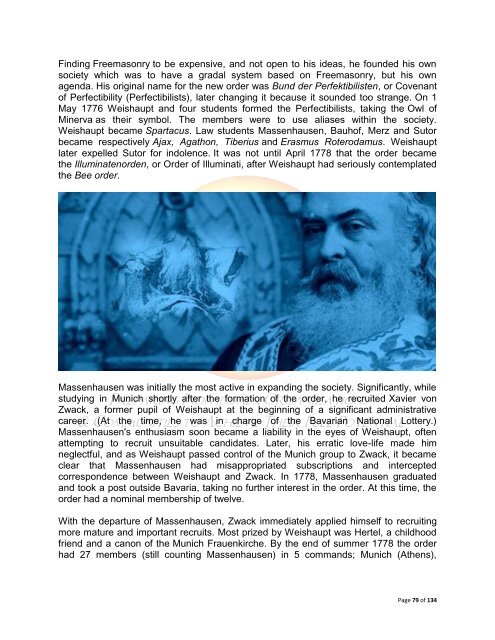Cultural Transformation
Cultural Transformation
Cultural Transformation
Create successful ePaper yourself
Turn your PDF publications into a flip-book with our unique Google optimized e-Paper software.
Finding Freemasonry to be expensive, and not open to his ideas, he founded his own<br />
society which was to have a gradal system based on Freemasonry, but his own<br />
agenda. His original name for the new order was Bund der Perfektibilisten, or Covenant<br />
of Perfectibility (Perfectibilists), later changing it because it sounded too strange. On 1<br />
May 1776 Weishaupt and four students formed the Perfectibilists, taking the Owl of<br />
Minerva as their symbol. The members were to use aliases within the society.<br />
Weishaupt became Spartacus. Law students Massenhausen, Bauhof, Merz and Sutor<br />
became respectively Ajax, Agathon, Tiberius and Erasmus Roterodamus. Weishaupt<br />
later expelled Sutor for indolence. It was not until April 1778 that the order became<br />
the Illuminatenorden, or Order of Illuminati, after Weishaupt had seriously contemplated<br />
the Bee order.<br />
Massenhausen was initially the most active in expanding the society. Significantly, while<br />
studying in Munich shortly after the formation of the order, he recruited Xavier von<br />
Zwack, a former pupil of Weishaupt at the beginning of a significant administrative<br />
career. (At the time, he was in charge of the Bavarian National Lottery.)<br />
Massenhausen's enthusiasm soon became a liability in the eyes of Weishaupt, often<br />
attempting to recruit unsuitable candidates. Later, his erratic love-life made him<br />
neglectful, and as Weishaupt passed control of the Munich group to Zwack, it became<br />
clear that Massenhausen had misappropriated subscriptions and intercepted<br />
correspondence between Weishaupt and Zwack. In 1778, Massenhausen graduated<br />
and took a post outside Bavaria, taking no further interest in the order. At this time, the<br />
order had a nominal membership of twelve.<br />
With the departure of Massenhausen, Zwack immediately applied himself to recruiting<br />
more mature and important recruits. Most prized by Weishaupt was Hertel, a childhood<br />
friend and a canon of the Munich Frauenkirche. By the end of summer 1778 the order<br />
had 27 members (still counting Massenhausen) in 5 commands; Munich (Athens),<br />
Page 79 of 134

















